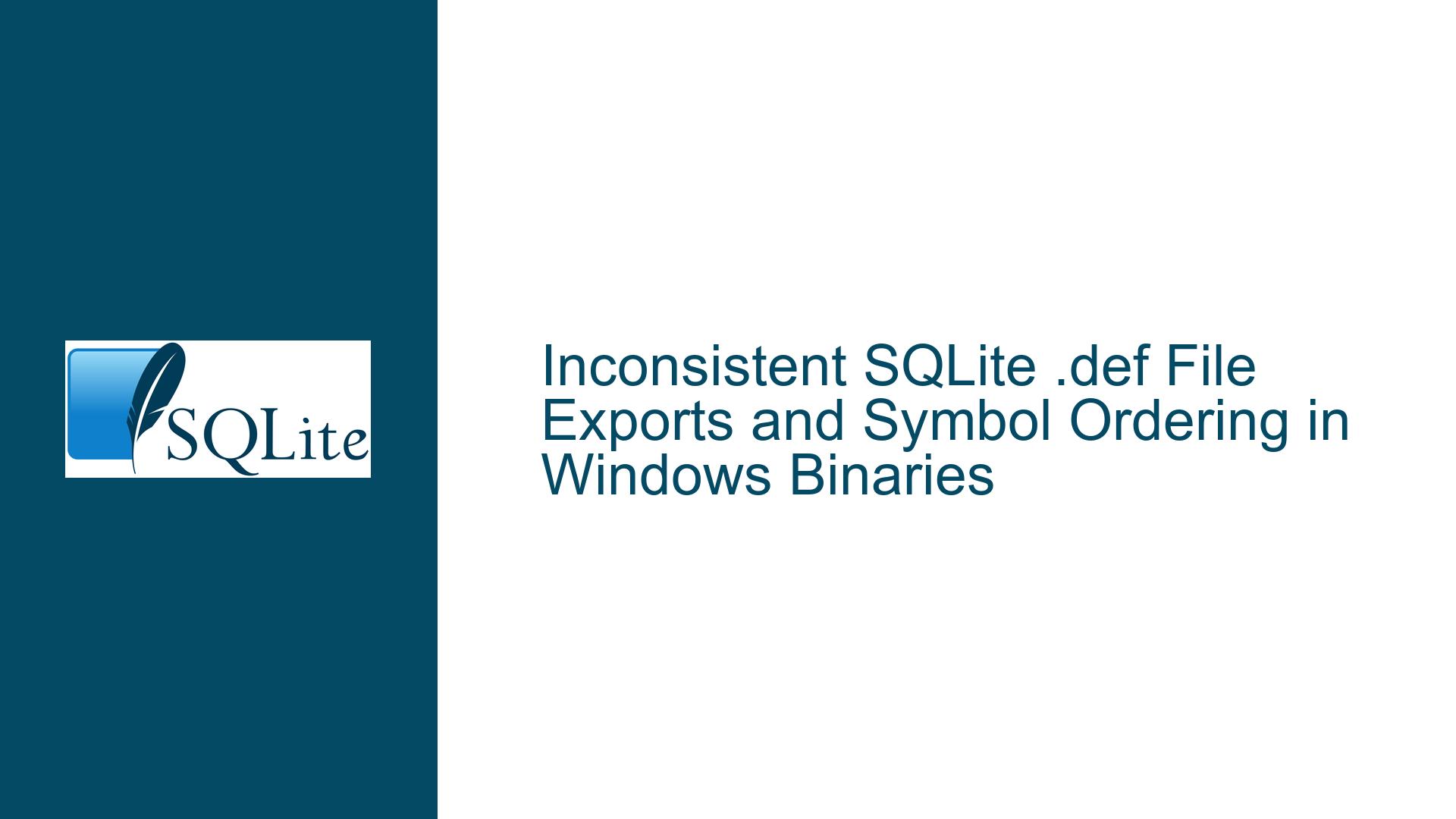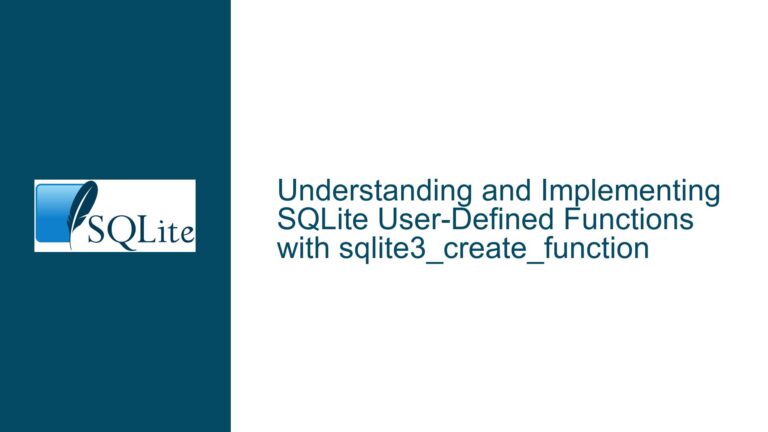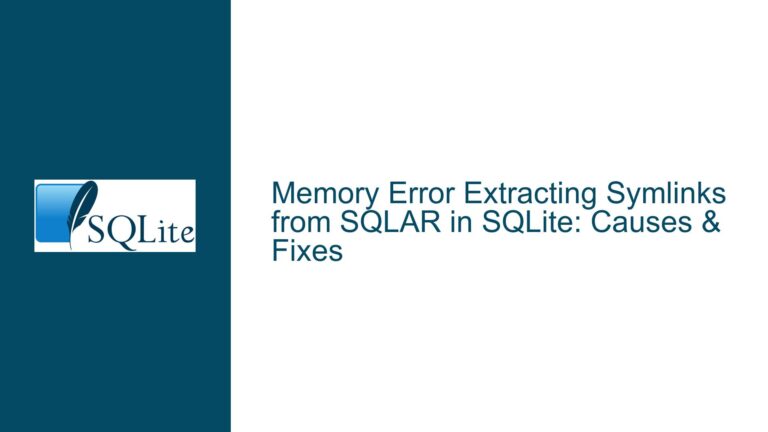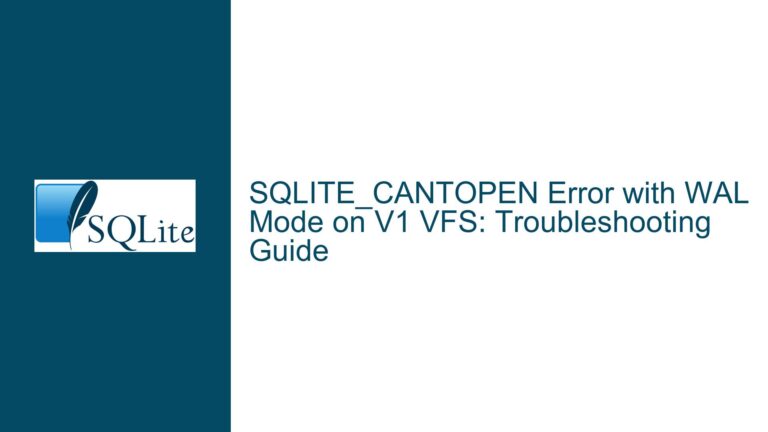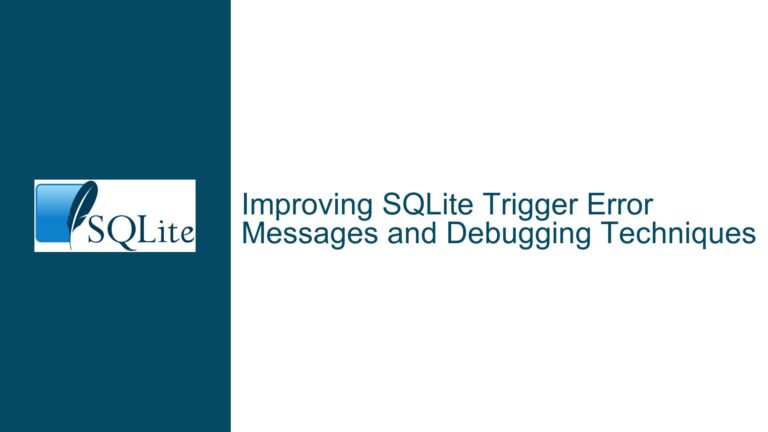Inconsistent SQLite .def File Exports and Symbol Ordering in Windows Binaries
Issue Overview: Missing Exported Symbols and Varied Symbol Order in 32-bit vs. 64-bit SQLite DLLs
The core issue revolves around discrepancies observed in the sqlite3.def files packaged with the 32-bit (sqlite-dll-win32-x86-3390200.zip) and 64-bit (sqlite-dll-win64-x64-3390200.zip) Windows binaries of SQLite version 3.39.2. Two distinct anomalies are present:
Symbol Sorting Order Differences: The order of exported symbols in the 32-bit and 64-bit
.deffiles is inconsistent. While the sorting order might seem trivial, it directly impacts the ordinal assignments of exported symbols. If applications or libraries depend on ordinal-based linking (a less common but valid practice), this discrepancy could introduce compatibility risks when upgrading or switching between architectures.Missing Exported Symbols in 32-bit .def File: Three global variables—
sqlite3_version,sqlite3_data_directory, andsqlite3_temp_directory—are absent from the 32-bit.deffile but present in the 64-bit version. Despite this omission, these symbols are still exported in the 32-bit DLL, as confirmed by tools like Dependency Walker. This raises questions about the reliability of the.deffile as the authoritative source of exports and whether the omission is intentional or a build artifact oversight.
The implications of these discrepancies are twofold. First, the inconsistent symbol ordering could affect binary compatibility for applications that implicitly rely on ordinal positions for dynamic linking. Second, the missing symbols in the 32-bit .def file create ambiguity for developers who expect explicit declarations of exported interfaces, particularly when integrating SQLite into build systems that generate import libraries directly from .def files.
Possible Causes: Build Process Variants and Symbol Export Mechanisms
To diagnose the root causes, we must dissect the SQLite build process for Windows binaries and the mechanisms governing symbol exports in DLLs.
Symbol Sorting Order Variability:
- Build Script Differences: The 32-bit and 64-bit DLLs might be generated using separate build scripts or toolchains. For instance, the 64-bit build could leverage a different linker or post-processing tool that sorts symbols differently (e.g., alphabetical vs. linkage order).
- Ordinal Assignment Policies: SQLite’s build process may not enforce a strict ordinal order across architectures. If the
.deffiles are autogenerated from the DLLs using tools likedumpbin /exports, the symbol order might reflect the linker’s internal layout, which can vary between 32-bit and 64-bit builds due to compiler optimizations or code generation differences.
Missing Symbols in 32-bit .def File:
- Implicit Export Mechanisms: SQLite might use
__declspec(dllexport)directives in its source code for certain symbols, bypassing the need for explicit.deffile entries. If the 32-bit build enables these directives for the three variables but the 64-bit build does not (relying instead on the.deffile), this would explain the asymmetry. - Conditional Compilation Directives: Platform-specific
#ifdefblocks in SQLite’s headers could exclude these variables from the 32-bit.deffile generation. For example, ifsqlite3_data_directoryis deemed unnecessary for 32-bit environments (e.g., due to legacy compatibility), the build script might filter it out. - Toolchain Artifacts: The 32-bit build might use a legacy module definition file that hasn’t been updated to include newer symbols like
sqlite3_temp_directory, whereas the 64-bit build uses a modernized version.
- Implicit Export Mechanisms: SQLite might use
Symbol Visibility in DLLs vs. .def Files:
- Linker Overrides: The linker (e.g., Microsoft’s
link.exeor MinGW’sld) might automatically export symbols marked with__declspec(dllexport)even if they’re absent from the.deffile. This would result in the variables being present in the DLL’s export table but omitted from the.deffile, creating a mismatch.
- Linker Overrides: The linker (e.g., Microsoft’s
Troubleshooting Steps, Solutions & Fixes: Resolving Symbol Exports and Ensuring Cross-Architecture Consistency
Validate Symbol Export Mechanisms:
- Inspect Source Code for Export Directives: Examine SQLite’s
sqlite3.hand related source files for__declspec(dllexport)annotations onsqlite3_version,sqlite3_data_directory, andsqlite3_temp_directory. If present, these directives override the.deffile, explaining why the symbols appear in the DLL despite being missing from the 32-bit.def. - Compare Build Scripts for 32-bit and 64-bit: Review the scripts or makefiles used to generate the Windows binaries. Look for differences in how the
.deffiles are constructed—e.g., one architecture might use a hand-maintained.deffile while the other autogenerates it.
- Inspect Source Code for Export Directives: Examine SQLite’s
Address Symbol Ordering Inconsistencies:
- Standardize Symbol Sorting: Modify the build process to enforce a consistent symbol order across architectures. This can be achieved by sorting the
.deffile entries alphabetically (or using another deterministic order) before passing them to the linker. Tools likesortor custom scripts can automate this step. - Explicit Ordinal Assignments: To eliminate ordinal-based compatibility risks, explicitly assign fixed ordinals to critical symbols in the
.deffile. For example:EXPORTS sqlite3_open @1 sqlite3_close @2 ...This ensures ordinals remain stable across releases and architectures.
- Standardize Symbol Sorting: Modify the build process to enforce a consistent symbol order across architectures. This can be achieved by sorting the
Correct Missing Symbols in 32-bit .def File:
- Manual .def File Augmentation: If the omission is confirmed to be unintentional, manually add the missing symbols to the 32-bit
.deffile:EXPORTS ... sqlite3_version sqlite3_data_directory sqlite3_temp_directory - Automate .def File Generation: Replace manual
.deffile maintenance with an automated process that extracts exports directly from the DLL or object files. For example, usingdumpbin /exports sqlite3.dlland parsing the output to generate a.deffile ensures parity between the DLL’s exports and the.defentries.
- Manual .def File Augmentation: If the omission is confirmed to be unintentional, manually add the missing symbols to the 32-bit
Test Binary Compatibility:
- Ordinal-Based Linking Tests: Compile a test application that imports SQLite functions by ordinal (e.g., using
__declspec(dllimport)with ordinals) and verify its functionality against both 32-bit and 64-bit DLLs. Inconsistent symbol ordering will manifest as runtime errors or crashes. - Name-Based Linking Tests: Ensure applications importing symbols by name function correctly across both architectures. This validates that the missing
.defentries do not affect name-based resolution.
- Ordinal-Based Linking Tests: Compile a test application that imports SQLite functions by ordinal (e.g., using
Engage with SQLite’s Build Maintainers:
- Report the Discrepancy: Submit a detailed issue to SQLite’s official repository or mailing list, highlighting the inconsistent
.deffiles and requesting clarification on the intended export mechanism for the three variables. - Propose Build Process Fixes: If the issue stems from build script flaws, contribute patches that unify the 32-bit and 64-bit
.deffile generation logic.
- Report the Discrepancy: Submit a detailed issue to SQLite’s official repository or mailing list, highlighting the inconsistent
Mitigation Strategies for End Users:
- Generate Custom Import Libraries: Developers relying on the 32-bit DLL can use tools like
lib.exe(from Visual Studio) ordlltool(from MinGW) to create import libraries directly from the DLL, bypassing the incomplete.deffile. For example:lib /def:sqlite3.def /out:sqlite3.lib /machine:x86 - Dynamic Symbol Lookup: Use runtime dynamic linking (
LoadLibrary/GetProcAddress) for the three variables, ensuring they’re accessible even if the import library lacks them.
- Generate Custom Import Libraries: Developers relying on the 32-bit DLL can use tools like
By systematically addressing these areas, developers can resolve the inconsistencies in SQLite’s Windows binaries, ensuring reliable symbol exports and consistent behavior across 32-bit and 64-bit environments.
